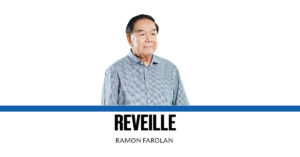There is no doubt that Bong Go, Bato dela Rosa and Francis Tolentino are dedicated to President Duterte and his agenda all the way, judging from the way Sara Duterte mentioned them as first among equals during the Hugpong ng Pagbabago campaign sorties.
But will the Senate, with the infusion of new members from PDP-Laban and Hugpong, really push Mr. Duterte’s agenda? Apparently, not all of the hatchlings in the President’s senatorial nest are solidly his. Apart from the independents, there are cuckoos mixed in. In time, they will show their real feathers.
The key item on the unfinished agenda is federalism. Mr. Duterte promised it, and two draft charters by the Puno-led consultative committee and the Arroyo-led House have been produced.
But while Mr. Duterte is popular among Filipinos, they do not support federalism. According to a Social Weather Stations survey in March last year, only 37 percent of Filipinos support a shift to federalism. In fact, only one out of four Filipinos have an idea what federalism is. Past midterm, the Duterte momentum to push federalism is gone, and doing so now will damage political careers.
In the final crunch, Mr. Duterte’s “supermajority” in the Senate will think twice before pushing the shift to federalism. Apart from the President’s diehard senators, the others will likely look after their own political careers, rather than blindly follow Mr. Duterte.
The main encouragement for the Duterte supermajority senators to break ranks comes from Mr. Duterte himself. In his talk before Japan-based Filipinos in his recent trip to Tokyo, the President said he has fulfilled all his promises to the Filipino people, and that he will spend the last three years maintaining the country on its present course.
This affirms Mr. Duterte’s loss of interest to push for federalism. He conveniently remembered federalism only when Nur Misuari, as a guest in Malacañang in March, made threatening noises about going to war if federalism didn’t happen.
In fact, there was hardly any mention of the grand strategies of the Duterte administration—the 10-Point Economic Agenda, Ambisyon 2040 and the Philippine Development Plan 2017-2022—in the so-called “referendum” on President Duterte’s performance, as if they were irrelevant or painful to bring up at midterm.
Instead of being proud of the Duterte administration’s most far-reaching economic reform to date, Sen. Sonny Angara, the “Father of the TRAIN law,” studiously avoided mentioning it during the campaign. The reason is simple. People associate the TRAIN law with the inflation jolt they experienced when the TRAIN law was implemented. A 2018 study by the Research and Tech Lab reports that out of 861 recorded sentiments online regarding the TRAIN law, 94 percent had negative themes: “it is a burden to Filipinos,” “it is antipoor,” and “citizens are dismayed by it.”
During the first half of the Duterte administration, there was a mix of grand strategies short of implementation details (e.g., federalism), and a lot of implementation details with no grand strategies (e.g., war on drugs). If it is accurate to see Mr. Duterte in this second half as a sick, sickly, tired and tiresome President, we should expect a lot more piecemeal granularity in presidential decision-making, as he hobbles toward the homestretch.
A case in point is his specific admonition to the Commission on Elections to change voting machine suppliers. How he has come to this detailed conclusion is a mystery. But it is perfectly in character, given the conspiracy matrices he has apparently single-handedly generated, without need or heed of completed staff work input from his intelligence agencies.
Perhaps President Duterte, no longer pushing a strategic agenda and just coasting along, will now himself be the arena of politics, as politicians, bureaucrats, entrepreneurs and other stakeholders compete for his attention and signature. They will, of course, be pretending that they are all doing so in pursuance of his radical change agenda. That makes them cuckoos just the same.
doyromero@gmail.com


